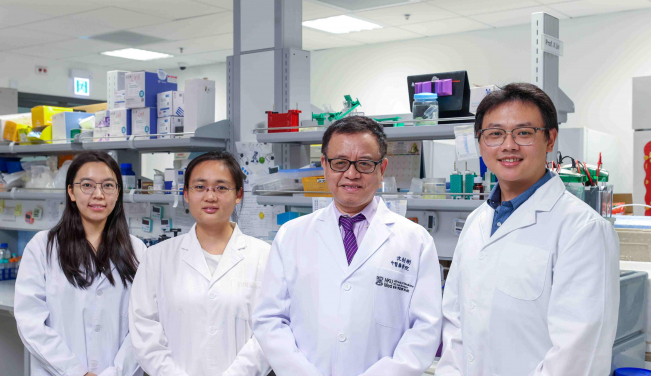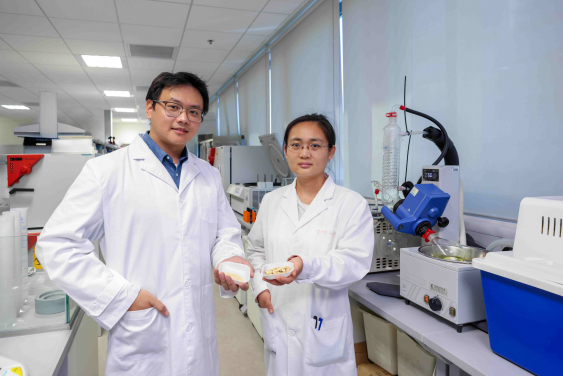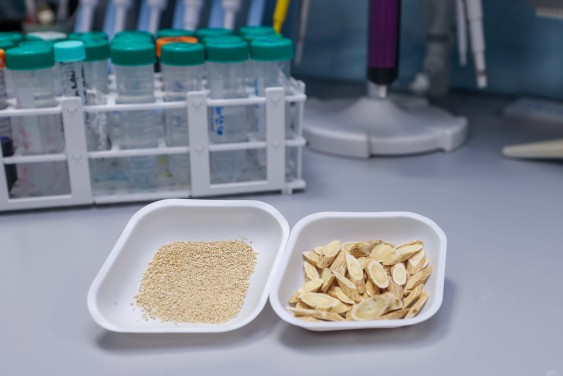Media
HKUMed develops combined therapy integrating Chinese herb astragalus and methotrexate to overcome drug resistance in autoimmune diseases
03 Jul 2025

A research team, led by Professor Lin Xiang (first right) and Professor Shen Jiangang (second right), has discovered that combining the active ingredient of the Chinese medicine Astragalus membranaceus (huang qi) with the conventional medication, methotrexate (MTX), can effectively reduce chronic inflammation in autoimmune diseases, providing a new solution to address the drug resistance and side effects caused by long-term medication.
Researchers at the School of Chinese Medicine, LKS Faculty of Medicine, the University of Hong Kong (HKUMed), have made a breakthrough in the treatment of autoimmune diseases. Their study reveals that combining the active ingredient extracted from the traditional Chinese medicine Astragalus membranaceus (huang qi) with the widely used Western drug methotrexate (MTX) can effectively reduce chronic inflammation in autoimmune diseases such as systemic lupus erythematosus and Sjögren’s disease. This study provides a new solution to address the drug resistance and the side effects caused by long-term medication. The research findings were published in two leading international journals, Acta Pharmacologica Sinica [link to publication] and Journal of Leukocyte Biology [link to publication], where they were featured as cover stories.
Autoimmune diseases are difficult to manage over the long term. These conditions occur when the patients’ immune system mistakenly attacks the body’s own healthy cells, resulting in damage to various tissues and organs. Patients often require continuous medication to control symptoms. Although MTX is commonly prescribed as a first-line treatment and is effective in easing inflammation, prolonged use inevitably leads to drug resistance, and high doses may result in severe side effects, such as liver toxicity.
In a comprehensive analysis of 1,640 traditional Chinese medicine formulas used over the past 40 years to treat five common autoimmune diseases, HKUMed research team, led by Professor Lin Xiang and Professor Shen Jiangang from the School of Chinese Medicine at HKUMed, found that Astragalus membranaceus is the most frequently prescribed medicinal herb. Using a self-developed mouse model and clinical data from patients, the team became the first to demonstrate that Astragalus membranaceus can inhibit ‘T follicular helper cells (Tfh cells)’, a type of immune cell known to attack healthy tissues in rheumatic diseases. Interestingly, while MTX is widely used in clinical settings, the study found that it does not effectively suppress Tfh cells and may even cause an increase in their number. In contrast, Astragalus membranaceus has shown a remarkable ability to effectively regulate Tfh cell activity, highlighting its significant therapeutic potential in managing autoimmune diseases.
In addition, the research team was the first to successfully isolate a bioactive compound called calycosin from Astragalus membranaceus, which can effectively inhibit Tfh cell responses in both humans and mice. They also found that calycosin is the first inhibitor to inhibit BATF, a core protein that controls the differentiation of Tfh cells. Since BATF is almost identical in humans and mice —sharing 99% structural similarity — these findings lay a vital foundation for cross-species therapeutic applications.
Calycosin can precisely inhibit the function of BATF, thereby suppressing Tfh cell activation and reducing autoantibody production. Importantly, calycosin addresses the therapeutic limitations of MTX. When used in combination, calycosin and MTX demonstrate significant synergistic effects, enhancing treatment outcomes. Even during the chronic phase of inflammation in mice with experimental Sjögren’s disease, the combined therapy provides significant protection to the affected target organs.
Professor Lin Xiang, Assistant Professor from the School of Chinese Medicine, HKUMed, stated, ‘Combining calycosin from Astragalus membranaceus with MTX allows us to effectively reduce drug toxicity while enhancing therapeutic effectiveness. This approach significantly lowers the required dosage of MTX without compromising its efficacy, thereby improving the overall safety of treatment. The research team recently filed an international patent for the use of calycosin in the treatment of autoimmune diseases, marking a milestone in the modernisation of traditional Chinese medicine research.’
This research holds great potential for clinical translation and is expected to overcome the drug resistance caused by long-term MTX medication. In the near future, this therapy could be extended to patients with other autoimmune diseases, providing evidence-based support for the modernisation of active ingredients in traditional Chinese medicine.
Furthermore, the research team has developed a ‘humanised mouse model of Sjögren’s disease’, which accurately recapitulates immune dysregulation in patients. Using this model, they validated the efficacy of the combined therapy in humanised mice with Sjögren’s disease, providing strong evidence to support future clinical trials. The findings were presented at the 2025 European Alliance of Associations for Rheumatology (EULAR) Annual Congress and were published in the Annals of the Rheumatic Diseases.
Acknowledgments
This research was supported by the General Research Fund and Areas of Excellence Scheme from the Hong Kong Research Grants Council; the Health and Medical Research Fund from the Health Bureau; the Mainland-Hong Kong Joint Funding Scheme; and the National Key Research and Development Programme of China.
Media enquiries
Please contact LKS Faculty of Medicine of The University of Hong Kong by email ([email protected]).


